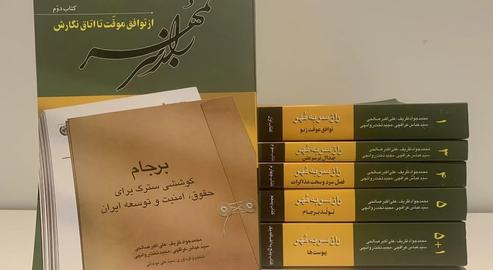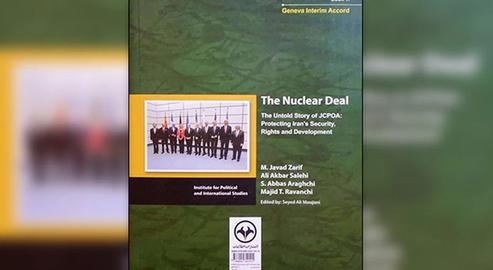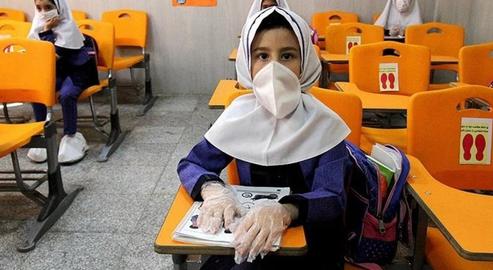In his last weeks in office, Mohammad Javad Zarif, who served as foreign minister of the Islamic Republic of Iran from 2013 to 2021, published a six-volume treatise on Iran’s nuclear negotiations with the P5 + 1: the five permanent members of the UN Security Council plus Germany.
Entitled The Sealed Secret, the book carries the subtitle “An Immense Endeavor for Iran’s Rights, Security and Development”. Besides Zarif’s own memoirs, the book also includes contributions and quotations from Ali Akbar Salehi, head of Iran’s Atomic Energy Agency during the pre-JCPOA nuclear talks, former deputy foreign minister Abbas Araghchi and Majid Takht-Ravanchi, a senior nuclear negotiator and Iran’s permanent representative to the UN.
In his last days in office, Zarif presented a copy of this book as a gift to the Russian Foreign Minister Sergey Lavrov. The following is a brief and broad account of its contents. IranWire will review the books in more detail in forthcoming articles.
***
Iranians might not all be aware that, despite all the anti-American propaganda, it was under the leadership of Ali Khamenei that the Islamic Republic first took the initiative for direct nuclear negotiations with the United States in 2009. For the first time in his newly-published book, The Sealed Secret, Javad Zarif provides – amongst a great many other things – an evidentiary account of how this happened.
“A few days before the 2009 [presidential] election,” Zarif writes, “between May 2 and 4, Dennis Ross, advisor to the US secretary of state, made a stop in Muscat and was given a copy of a letter called the ‘Iranian proposals’ from the Omanis. He took it with him to Washington.”
Considering the dominance of Ayatollah Khamenei over all the Islamic Republic’s most important state affairs, including contact with foreign governments and most especially the United States, there can be no doubt that he knew about this overture to the Americans. Nevertheless, Zarif writes, “it is not clear which government authority and who delivered these proposals to Oman.”
The year 2009 was a turbulent one for the Islamic Republic. Its consequences are still being felt more than a decade later. Ayatollah Khamenei may well have been angered at the widespread protests over the disputed presidential election that year, precisely because they disrupted his plans for negotiating with the US.
Obama’s “Yours Truly” Letters to Khamenei
In the final months leading to the election, then-US president Barack Obama engaged in some correspondence with Khamenei. After the protests erupted, he strove to say nothing in support of the pro-democracy demonstrators so as not to provoke Iran’s Supreme Leader. Nonetheless, he broke his silence to condemn the killing of Neda Agha-Soltan by security forces. This enraged Khamenei, who then repeatedly criticized Obama in public – in part for having signed off his letters with “Yours Truly”.
Zarif’s new book alleges that besides the letters Obama sent to the Supreme Leader through the Swiss embassy in Tehran, he sent others to Khamenei through Wendy Sherman, then-deputy secretary of state, while the nuclear negotiations were going on.
But after the initial failure of bilateral talks between Iran and the US one year after the 2009 protest, and the continuation of the nuclear impasse, the UN Security Council passed the damning Resolution 1929 against the Islamic Republic. Zarif writes: “A year after the resolution, the seizure of Iranian ships began. Hong Kong, Malta and Singapore were the first three ports where this sanction took effect. Just a few weeks later, the three ships Sahand, Sabalan and Tochal, and two other ships that had been seized at Singapore, were auctioned off after a complaint brought by a French bank.”
Another Round of Unsuccessful Secret Negotiations
Two years after Iran’s initial attempts to engage in direct negotiations with the US, as the effects of international sanctions worsened, Iran again asked Oman’s Sultan Qaboos to act as an intermediary. This time it was Ali Akbar Velayati, Khamenei’s advisor for international affairs, who carried the message to Oman – although at that time, Velayati categorically denied it.
The Sealed Secret makes leaves no room for doubt that Ayatollah Khamenei was personally involved in supervising the negotiations while Saeed Jalili, secretary of the Supreme National Security Council, was officially charged with oversight of talks with the P5 + 1 in Kazakhstan. The discussions were all recorded on tape.
In the planning session for one secret meeting slated to take place between Iran’s deputy foreign minister and the American deputy secretary of state, then-Foreign Minister Ali Akbar Salehi suggested that this meeting take place in Muscat “as soon as possible” so that all parties in the public P 5+1 talks could take the results into account.
Salehi, who has contributed to Zarif’s book, quotes Khamenei as having said: “I am not for or against it, but coordinate it with Dr. Jalili.” This response is typical of Khamenei, who often refuses to take responsibility even after he himself has been involved in the details.
Salehi then adds that Saeed Jalili, his deputy Ali Bagheri and Intelligence Minister Heydar Moslehi jointly decided the meeting with the Americans could take place only after the current round of talks in Kazakhstan had subsided. The US, it was decided, must be asked to allow uranium enrichment in Iran in exchange Iran upholding the “fatwa”: a reference to a statement by Khamenei in which he had personally prohibited the development, stockpiling and use of nuclear weapons.
According to Zarif’s book, the US was close to accepting uranium enrichment by Iran and the meeting in Oman could well have sped up lifting of sanctions. But it was delayed, and the changing of the administration in Iran then made the situation more complex.
Although Iran had now twice initiated direct talks with the US, in his speech to mark the Iranian new year in March 2013, Khamenei said: “The Americans are sending us messages through different channels, inviting us to talk about the nuclear question.” He then publicly declared his assent with such talks continuing.
According to Zarif’s new book, Ayatollah Khamenei had ordered that negotiations with the 5+1 be different from the content of the secret meetings in Oman. But when Hassan Rouhani took over the presidency, the Supreme National Security Council handed over the talks in Oman to the foreign ministry, and in effect, the two teams became one.
Criticizing Khamenei — Indirectly
The Sealed Secret also frankly criticizes President Ahmadinejad’s conduct during the nuclear negotiations. But in many places, it is also quite clear that the book is implicitly lambasting Ayatollah Khamenei too, and holds him responsible. At one point, the writers clearly complain that certain speeches by Khamenei gave his supporters with an excuse to attack both the government and the negotiating team.
For instance, according to the book, between the interim nuclear agreement and the finalizing of the JCPOA, Ayatollah Khamenei publicly criticized the US in a bid to “strengthen the hand of the negotiators”. But, in practice, the attacks put the negotiators under enormous pressure inside Iran and made them targets of serious allegations against them. Without explicitly naming names, the writers point a finger at the IRGC and Gando: a spy thriller TV series produced by the Guards, which claimed foreign intelligence services had penetrated Iran's nuclear team, and frequently referred to Zarif – without naming him – as an infiltrator who dished out intelligence to foreigners.
Zarif’s book portrays Ahmadinejad as a liability, prone to antics like sending letters to George W. Bush and Barack Obama, inviting them to meet him in public. The former president even did so while he was in New York to attend the UN General Assembly, while Zarif was still Iran’s ambassador to UN. Ahmadinejad, of course, did so with the permission of the Supreme Leader but Khamenei did not publicly support him. Eventually as a result, Ahmadinejad removed himself from the nuclear talks.
The book also features a story from Ali Asghar Khaji, a deputy foreign minister under Ahmadinejad who was secretly talking to the Americans in Oman. Salehi, who was then the foreign minister, asked him to meet with Ahmadinejad and give him an oral report. After the meeting, Khaji told Salehi: “I went to see Dr. Ahmadinejad. ‘Mr. Khaji, I have read your reports,’ he said. ‘Dr. Ahmadinejad,’ I said, ‘this is not enough. We need your help and your views in dealing with the Americans.’...He looked at me but didn’t answer. He just said ‘goodbye’.”
Taking Notes Was “Beneath” Them
The writers present Saeed Jalili and the early nuclear negotiating team as inept, unimaginative and inexperienced, unable to grasp the opportunity to ease the crisis and find means of resolving it for good. One example The Sealed Secret cites is the absence of recorded minutes of the negotiations and, in some cases, negotiators reported the same meeting differently. These divergent reports, and “numerous errors in recording crucial words and phrases”, in turn confused decision-makers in Tehran. The book suggests the negotiators considered taking notes “beneath” them.
Abbas Araghchi was the only senior nuclear negotiator during Ahmadinejad’s presidency who remained in post under Rouhani, and played a key role in arriving at the JCPOA. Araghchi is a contributor to the book and in some passages is referred to as Iran’s “bad cop” during the talking.
For his part, he tells an anecdote about his meeting with Zarif in the elevator of Rouhani’s residence after the latter’s 2013 presidential election victory. At the time Zarif had not yet accepted Rouhani’s offer to serve as his foreign minister. When Araghchi asked him why, Zarif told him: ‘In the end we’ll be found wanting, and we will be the victims.”
Zarif was referring to the predictable internal pressure and criticism, which came to a crescendo during his last weeks in office. After Zarif’s interview in which he criticized the Revolutionary Guards’ role in sabotaging Iran’s foreign policy was leaked, Ayatollah Khamenei called his comments a “repetition of the hostile talk of our enemies”.
Related Coverage:
Zarif's Farewell Letter to Parliament Reveals Obstacles Blocking a JCPOA Return
Zarif Apologizes After Khamenei Reprimands Him in Telling Speech
Revolutionary Guards Raid President and Foreign Minister's Offices
48 Hours of Tumult: The Aftermath of Zarif's Interview
Zarif Blames Russia and the Guards for Harming the JCPOA in Leaked Interview
Zarif vs. the Guards: A New Round
IranWire Exclusive: Javad Zarif is "Frustrated" With the Guards and the Government
The Salehi Memoirs: Diplomat, Scientist, Negotiator
The Zarif Memoirs: Portrait of Rebellious Diplomat
visit the accountability section
In this section of Iran Wire, you can contact the officials and launch your campaign for various problems



























comments